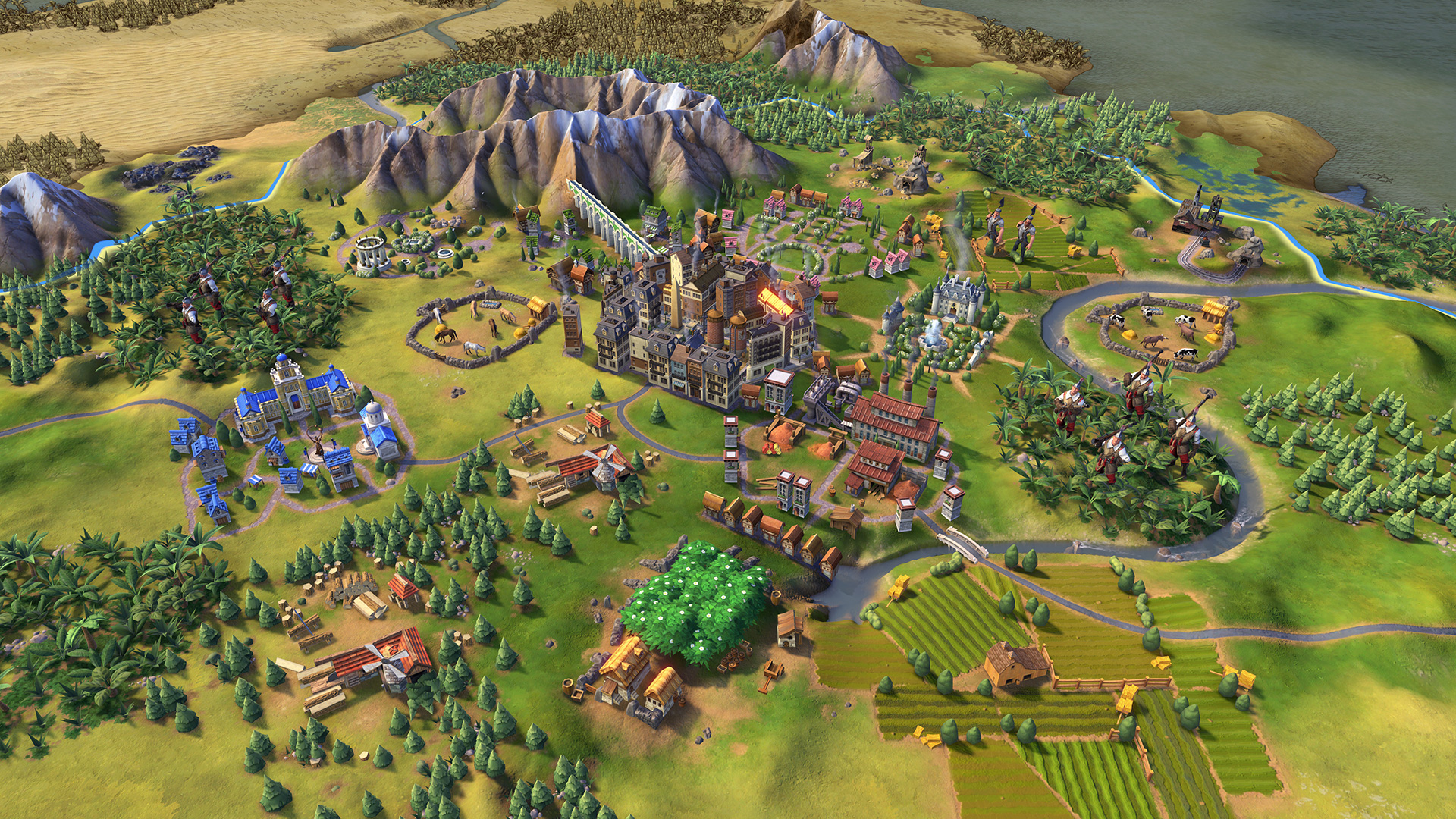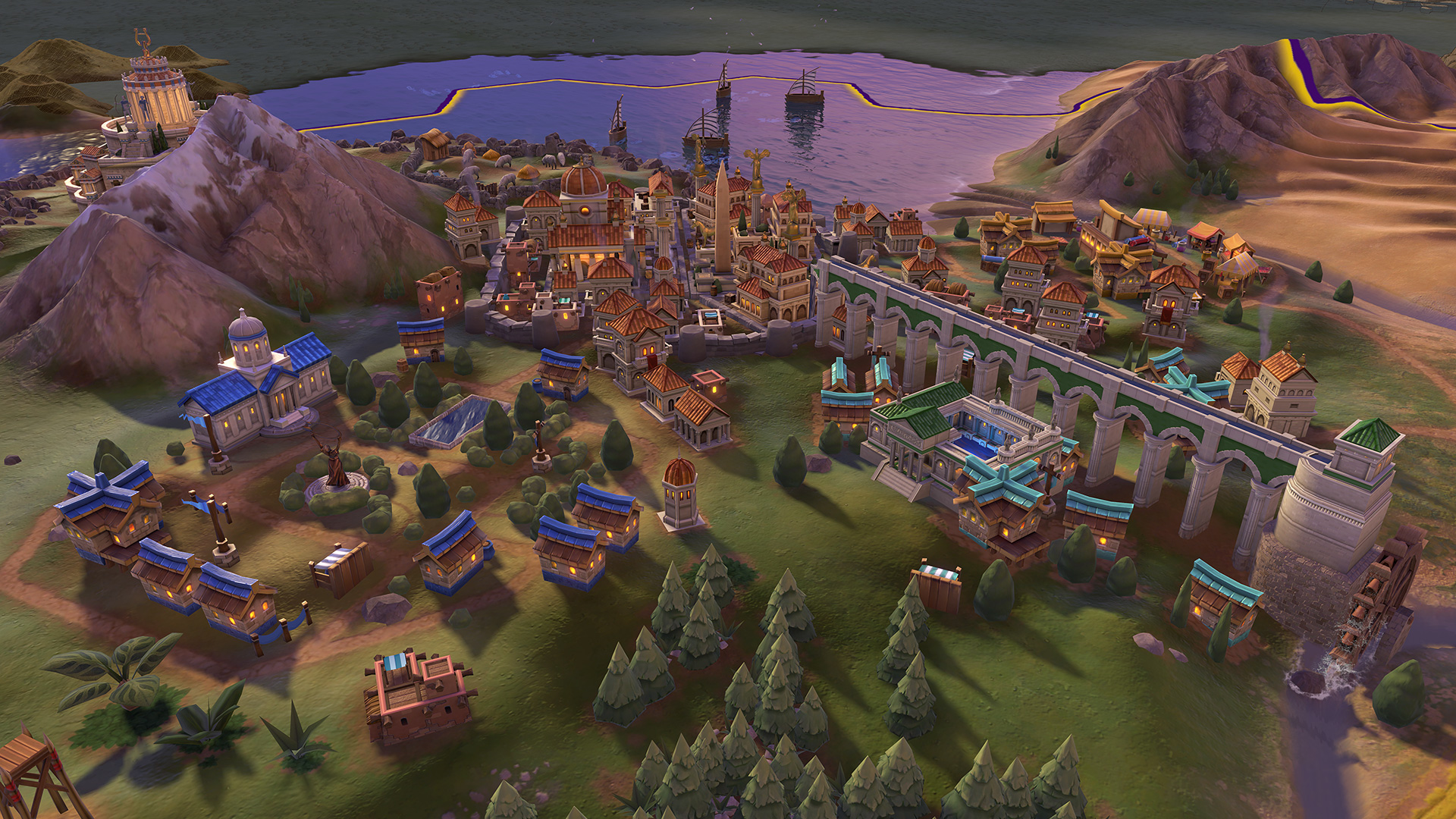Platform:
PC
Released:
October 21, 2016
Publisher:
2K Games
Developer:
Firaxis
The grand-daddy of grand strategy is back and he’s looking more grand then ever before. Yes, it’s the dawn of a new civilisation, Civilization VI to be exact. No longer in its infancy, Civilization as a franchise has evolved a lot throughout the ages (sometimes for the better and sometimes for the worse) but I have to say that this most recent iteration is seriously fantastic.
For the uninitiated, Sid Meier’s Civilization VI is a turn-based, 4X strategy game developed by Firaxis for the PC. 4X being a term used to describe games in which you eXplore, eXpand, eXploit and eXterminate. Starting off the game with a single settlement you progress through the ages, discover other empires, expand your territory and grow your civilisation into modern, booming hubs of militaristic force, culture, science and/or faith.
Civilization has always been a huge player in the 4X strategy genre and its good to see that the newest iteration isn’t afraid to adopt mechanics from older games or scrap mechanics that were less intuitive or fun. Civ 6 also brings in a whole boat load of new content and has reworked and updated older systems as well. The sheer amount of changes to the newest game was actually quite overwhelming at first but once I got my head wrapped around them I begun to appreciate the level of depth and intricacy Civ 6 brought to the table. For those heading into Civilization for the first time be warned, whilst the game does a fantastic job at being as user-friendly and logical as possible – the mere depth of design can be difficult for players to grasp and overcome. However, once you reach a certain level of understanding you will find one of the richest and most tactically rewarding experiences that gaming has to offer.
Philosophy of Design
After spending some considerable time with the game, some of Civ 6’s design goals begun to become abundantly clear. Improvements weren’t just made at a surface level but instead there was large, sweeping changes that altered the gaming experience at its core. Two of which included: more active player engagement and a more complete base game.
I find it so impressive that Civilization VI feels so complete as a base game. One of the most infuriating things about previous games within the series is that they would release with less content than the previous iteration, and then repackage that missing content further down the line as expansions. Both religion and government were staples of Civ 4 for instance but were missing from the release version of Civ 5. The newest game absolutely does not have this issue and it comes with more content than Civ 5 ever had, including all of Civ 5’s expansions.
It really does feel like the developers went the extra mile to make Civ 6 the best and most complete possible experience for the player. Even going as far as to hire Sean Bean to do all of the in-game narration.

Compared to older titles within the franchise, Civ 6 also requires the player to engage at a more active level. Win conditions can no longer be achieved by sitting back and passively watching numbers grow. In fact, the entire cultural play style has been completely reworked with this goal in mind. In Civ 5 a cultural victory was earned through having high cultural output which moved you through a social policy tree until you reached the end. In Civ 6 cultural output isn’t all that is needed. Instead, culture will move you through a civics tree that will unlock governments and policies which amongst other things, give bonuses to your empires tourism. Tourism is also boosted through specific wonders, befriending city states, artefacts and great works which can be earned through the recruitment of great writers, artists and musicians. The artefacts and great works must then be stored in specific building such as the museum to begin attracting tourists. Once you have more visiting tourists than any other empire has domestic tourists, you win. If that to you sounded complicated, don’t fret, because it is – but it also perfectly highlights how Civ 6 has deeper, more actively engaging systems then what came before it.
Whilst we are on the subject of cultural victory I will give one of my only criticisms I have for the title. And that is that culture is seemingly the most complicated and difficult victory to achieve. So much so that it became frustrating and unappealing comparative to other play styles. Juggling city state management, government policies, wonder construction, great person recruitment, housing for great works, artefact discovery, housing for artefacts and empire diplomacy – it was just so micromanagey. I like that there is more depth to the system but it can be fatiguing for those of us who aren’t masters of the game.
The Evolution of Civ 5 to Civ 6
A whole slew of changes have gone into the newest iteration of the Civilization series. So many that I won’t possibly be able to cover them all, but I’ll discuss the ones I found the most impactful.
Religion is back and better then ever, in fact it’s an entire win condition now! A religious victory occurs when over 50% of the population of every city is worshipping your religion, and this is achieved through high faith output and through theological warfare. Theological warfare is a new mechanic where religious units literally fight for domination and for the right to spread their particular belief system. These fights won’t trigger a war and will take place over pretty much the entire play experience. Killing an opposing players religious units will give a boost to your religion in surrounding cities and will stop them from moving their units into other cities to strengthen their cause. An entire religion can be completely stamped out by converting all followers of that religion to another faith which makes the faith game a very active and continued battle.
Also new to Civ 6 are Eurekas and Inspirations which boost your progress towards earning scientific and cultural discoveries. These boost come when specific in-game tasks are achieved and they serve as an engaging way to maximise your efficiency. The game has also implemented districts which serve as hubs for specific outputs such as science, production, faith, and more. These districts as well as all wonders have to be placed on their own tile within the cities borders, which makes for a more visually appealing empire as well as adding a layer of depth to where they are placed. Global happiness has been removed and replaced with a more logical and less frustrating amenities system that means your citizens are no longer getting upset because you conquered a new city.
The game has also replaced workers with builders that work on a charge system using up 1 of 3 charges for creating a tile improvement. This system works well because firstly, you no longer have to wait for a tile to become improved making for a more active experience and secondly because you have to be more aware of what you set your builder to improve. Also new are that units can be stacked to create a more powerful force or create an escort and that trade routes and roads have been revamped and are no longer as demanding to create.

Multiplayer and AI
Artificial Intelligence seems to still be Civilizations Achilles heal. There have been some changes and improvements to enemy AI but honestly as a whole it’s not really at the same level as the rest of the playing experience. AI will start confusing wars with you but not follow through, they are straight up bad at tactical combat and they make confusingly 1 sided trade arrangements not always in their own favour. I also find it shocking to see the enemy AI send out settler units unescorted, even on some of the highest difficulty levels. The AI can also be very difficult to befriend thanks partially to hidden agenda’s that turn them against you without you knowing exactly why. I don’t specifically dislike this system, after all, why should I know their personal agenda’s; however, sometimes the hidden values that come along with diplomacy feel like they exist more to cover up and excuse oddities in AI decision making than to have actual meaningful gameplay implications.
Enemy barbarian AI on the other hand is more intelligent. They are more ruthless too, especially if spawning nearby to a horse tile because if this happens they will get more powerful horse-mounted units. The ruthlessness of these barbarian is actually really great though because it forces players to build an early army and hunt down barbarian outposts rather than ignoring them. The horse-mounted units may be a tad too difficult but I’m personally enjoying the challenge.
The multiplayer experience on the other hand seems pretty solid. Improvements to the multiplayer are few and far between but an online speed for the game has been introduced which serves as a fantastic tool. Anybody who has dived into a Civ game in the past knows that the game goes on for so long that a proper multiplayer experience is unlikely to be seen through to the end. The online speed is double that of the standard speed and whilst a lot of Civ 6 games may still not ever be finished, the online speed will help online players see that end game more often than before.
Positive:
- Deeper, more tactical strategy
- More actively engaging gameplay
- Very complete, polished experience
Negative:
- Enemy AI is still Civilization's weak point
Ultimately, despite AI incompetencies, Civilization 6 has turned the franchise into a deeper, richer experience than it was before. For strategy lovers or even someone looking to try out the genre for the first time I would recommend Civ 6 wholeheartedly. Without a doubt Civ 6 will be one of my favourites games to emerge from 2016… now if only it allowed me to emerge out my house. I just want to take one more turn…













